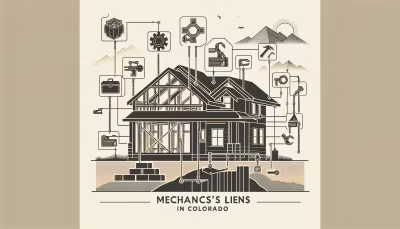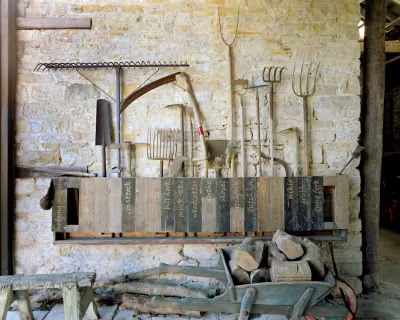When it comes to construction projects, whether large-scale developments or smaller renovations, payment issues can arise that leave contractors, subcontractors, and suppliers unpaid for their work. Mechanics' liens serve as an essential legal tool in Colorado to secure payment for labor and materials provided on construction projects.
Understanding how mechanics' liens work is crucial for anyone involved in Colorado's construction industry. This comprehensive guide covers everything from the basics to key legal considerations you need to know.
What is a Mechanics' Lien?
A mechanics' lien is a legal claim against a property that secures payment for labor, materials, or services provided to improve or repair that property. In Colorado, mechanics' liens are governed by the Mechanics' Lien Statute, which outlines the specific procedures and requirements for filing and enforcing these liens.
This legal tool gives contractors and other construction professionals a way to protect their financial interests when property owners fail to pay for completed work.
Who Can File a Mechanics' Lien in Colorado?
Various parties involved in a construction project have the right to file a mechanics' lien in Colorado, including:
Contractors: Those who contract directly with the property owner for construction work
Subcontractors: Individuals or companies hired by the general contractor to perform specific tasks
Material Suppliers: Entities that provide materials used in the construction project
Laborers: Individuals who provide labor or services directly related to the improvement of the property
For more detailed information about eligibility requirements, see our guide on who can file a mechanics' lien in Colorado.
The Mechanics' Lien Filing Process
Filing a mechanics' lien in Colorado involves several critical steps that must be followed precisely to ensure the validity and enforceability of the lien.
Step 1: Notice of Intent to Record Lien Statement
The first step to assert and enforce a Colorado mechanics lien is filing a "Notice of Intent to Record Lien Statement." Under C.R.S. 38-22-109(3), contractors, subcontractors, or material suppliers must provide both the property owner and general contractor notice of their intent to file a mechanics lien ten days prior to filing the lien statement with the county clerk and recorder.
This step is critical. Failure to properly serve both the homeowner and prime contractor will void the construction lien. The notice must be personally served or sent via certified mail. Learn more about this crucial document in our article about the Colorado Notice of Intent to File a Mechanics' Lien.
Step 2: Filing the Lien Statement
After serving the Notice of Intent, the next step is filing and recording the actual Lien Statement. The timing requirements vary based on the type of claimant:
Day laborers: Must record within two months after the last day of labor was provided
All others: Must complete within four months after the last day of labor was performed or materials were furnished
Understanding these deadlines is essential - our detailed explanation of Colorado's four-month rule for filing a mechanics' lien provides additional guidance.
Step 3: Extending the Lien Statement (Optional)
The Mechanics' Lien statute allows contractors to extend the time to file the Lien Statement by filing a "Notice Extending Time to File a Lien Statement" in the county where the property is located. This notice must include:
The legal description and/or address of the property
The name of the person with whom the lien claimant has contracted
The lien claimant's name, address, and telephone number
Upon filing this notice, the deadline to file a Lien Statement extends to either:
4 months after completion of the structure/improvements, or
6 months after the date the Notice was filed
Whichever occurs first. The Notice automatically terminates 6 months after filing.
Step 4: Foreclosure Action
The final step is initiating a foreclosure lawsuit. This lawsuit must be filed within 6 months from the last day that labor was provided or materials were furnished. If a foreclosure lawsuit is not filed within this timeframe, the contractor loses the right to foreclose the lien under C.R.S. 38-22-110.
For homeowners facing this situation, our guide on mechanics' lien foreclosure lawsuits in Colorado explains what to expect.
Key Legal and Practical Considerations
While mechanics' liens can be powerful tools for securing payment, several important factors should be considered before filing or responding to one.
Notice Requirements and Timing
Strict adherence to notice requirements and deadlines is essential. The failure to properly serve required notices or meet filing deadlines will void the lien entirely. Property owners should understand that what happens after a contractor files a mechanics' lien involves specific legal processes and timeframes.
Lien Waivers
Property owners may request that contractors and subcontractors sign lien waivers, which waive their right to file a mechanics' lien. It's essential for all parties to understand the implications of signing such waivers and ensure appropriate compensation is received before waiving lien rights.
Priority of Liens
When multiple mechanics' liens are filed against the same property, their priority determines the order in which they are satisfied from foreclosure sale proceeds. If insufficient equity exists in the property to cover the lien amount, it may be advisable to forego a foreclosure action.
Cost Considerations
Court costs and attorney fees for enforcing a mechanics' lien through legal action can accumulate quickly. It's essential to assess whether the lien amount justifies the expense of pursuing legal action.
Importantly, many cases have held that a lienor is not entitled to recover attorney fees in a mechanics' lien lawsuit. In cases where the lien amount is relatively small, litigation costs may outweigh potential recovery, making court enforcement impractical.
Common Filing Mistakes
Many mechanics' liens fail due to procedural errors. Understanding common mistakes to avoid when filing a mechanics' lien in Colorado can help ensure your lien is valid and enforceable.
Protecting Your Rights
Whether you're a contractor seeking payment or a property owner facing a lien claim, understanding your rights is crucial. Homeowners can learn about how to remove a mechanics' lien in Colorado and what evidence helps defeat a mechanics' lien.
Contractors should understand what they must prove to enforce a mechanics' lien and how much they can claim in their lien.
Conclusion
Mechanics' liens play a vital role in protecting the interests of contractors, subcontractors, and suppliers in Colorado's construction industry. By understanding the legal requirements and procedures associated with mechanics' liens, parties can effectively navigate payment disputes and protect their financial interests.
However, the complexities of mechanics' lien law make it challenging to handle these matters without experienced legal guidance. The strict deadlines, notice requirements, and potential for costly mistakes underscore the importance of working with an attorney who specializes in construction law.
Whether you need to file a lien to secure payment or defend against a lien claim, professional legal assistance can help ensure your rights are protected throughout the process.
Have Questions About Mechanics Liens?
Our experienced construction defect attorneys are here to help. Schedule a free 15-minute screening call to discuss your situation.




